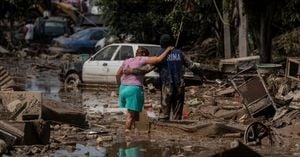On Monday, August 25, 2025, President Donald Trump signed an executive order that could dramatically reshape the use of military personnel in domestic law enforcement across the United States. The order, which calls for the creation of a National Guard "quick reaction force" ready for rapid nationwide deployment, has ignited heated debate over presidential authority, the role of the military in civil society, and the future of American democracy.
According to reports from multiple outlets, including The Washington Post and Politico, the executive order directs Defense Secretary Pete Hegseth to ensure that National Guard units in every state are "resourced, trained, organized, and available to assist Federal, State, and local law enforcement in quelling civil disturbances and ensuring public safety." The order further instructs Hegseth to establish a standing National Guard quick reaction force for deployment anywhere in the country, and to work with each state's adjutant general to determine how many Guard troops should be on standby for rapid mobilization.
State National Guard units are typically controlled by governors, except during certain emergencies. However, the president can federalize the Guard or take control in unique jurisdictions like Washington, D.C., where Trump has already mobilized troops this month. Guard members from West Virginia, Louisiana, Ohio, Mississippi, Tennessee, and South Carolina have also been sent to the nation’s capital to assist with what the administration describes as efforts to restore public order.
Not everyone is on board with the president’s aggressive approach. Free DC, an advocacy group for district self-governance, issued a strongly worded statement condemning the move as dictatorial. The group warned, "Trump is laying the groundwork to quell all public dissent to his agenda. If he is successful, it would spell the end of American democracy. We refuse to allow that to happen." Their concerns echo a broader national conversation about the balance between security and civil liberties, and whether the executive branch is overstepping its bounds.
President Trump, for his part, has been unapologetic about his intentions. In comments made in the Oval Office on Monday, he argued that deploying the National Guard could swiftly "solve" crime in major cities. He specifically pointed to Chicago as a potential next target for deployment, stating, "We go in, we will solve Chicago in one week." However, he also indicated that he would prefer Democratic Governor J.B. Pritzker to request Guard assistance, adding, "I think until I get that request from [Gov. JB Pritzker], I'm not going to do anything about it." Still, Trump left open the possibility of unilateral action, remarking, "We may just go in and do it, which is probably what we should do. The problem is it’s not nice when you go in and do it, and somebody else is standing there saying, as we give great results, say, ‘Well, we don’t want the military.’”
Governor Pritzker was quick to push back, taking to social media to state, "I’ve said it once, and I’ll say it again and again: We don’t have kings or wannabe dictators in America, and I don’t intend to bend the knee to one." His comments highlight the deepening rift between state and federal authorities over who should control the response to civil unrest and crime.
The president’s executive order comes against the backdrop of recent deployments of the California and D.C. National Guards. Earlier in the summer, Trump called up the California National Guard to quell protests over immigration enforcement in Los Angeles, a move that was met with resistance from California Governor Gavin Newsom and Los Angeles Mayor Karen Bass. Newsom has since challenged the president’s authority in court, a legal battle that remains unresolved.
Similarly, Trump’s decision to deploy the D.C. National Guard—over which he has direct authority, since the district is not a state—has been controversial. According to Politico, the order also calls for the D.C. National Guard to establish and expand a specialized unit focused on public safety, further signaling the administration’s intent to use military resources in policing roles. Secretary Hegseth approved guard members in D.C. to carry their service weapons late last week, a detail confirmed by several news outlets.
Trump’s willingness to bypass governors in deploying the National Guard has alarmed critics who point to the 1878 Posse Comitatus Act, which generally prohibits federal military forces from engaging in domestic law enforcement. While the National Guard operates under a unique legal framework that sometimes allows for domestic deployment, the president’s actions have raised questions about the limits of executive power.
At his press conference, Trump dismissed accusations that his approach is antidemocratic. “They say, ‘We don’t need ‘em. Freedom, freedom. He’s a dictator, he’s a dictator,’” Trump said of his critics. “A lot of people are saying, ‘Maybe we like a dictator.’ I don’t like a dictator. I’m not a dictator. I’m a man with great common sense and a smart person. And when I see what’s happening to our cities, and then you send in troops, instead of being praised, they’re saying, ‘You’re trying to take over the republic.’ These people are sick.”
The Pentagon, meanwhile, is reportedly considering deploying the National Guard to Chicago to curb crime, in a mission similar to that in D.C. Trump has also threatened to send troops to Baltimore, following a public spat with Maryland Governor Wes Moore. This pattern of targeting cities led by Democratic officials has not gone unnoticed, fueling accusations that the administration’s moves are politically motivated.
Several Republican-led states have already contributed National Guard troops to the D.C. mission, signaling partisan divides over the use of military force in domestic affairs. Governors in GOP-controlled states have generally expressed support for the president’s initiatives, while Democratic leaders have mounted legal and rhetorical challenges.
Many details about the operational design and oversight of the new quick reaction force remain unclear. Civil liberties advocates, legal scholars, and local officials are watching closely to see how the administration implements the order and whether further deployments will be made without state consent. The coming weeks could prove pivotal as court challenges proceed and as the White House weighs more aggressive interventions in cities it deems troubled.
As the nation grapples with questions about security, governance, and the proper role of the military, the debate over Trump’s executive order is likely to intensify. For now, the president’s willingness to use the National Guard as a tool for domestic law enforcement marks a significant—and controversial—turn in how America polices itself.



